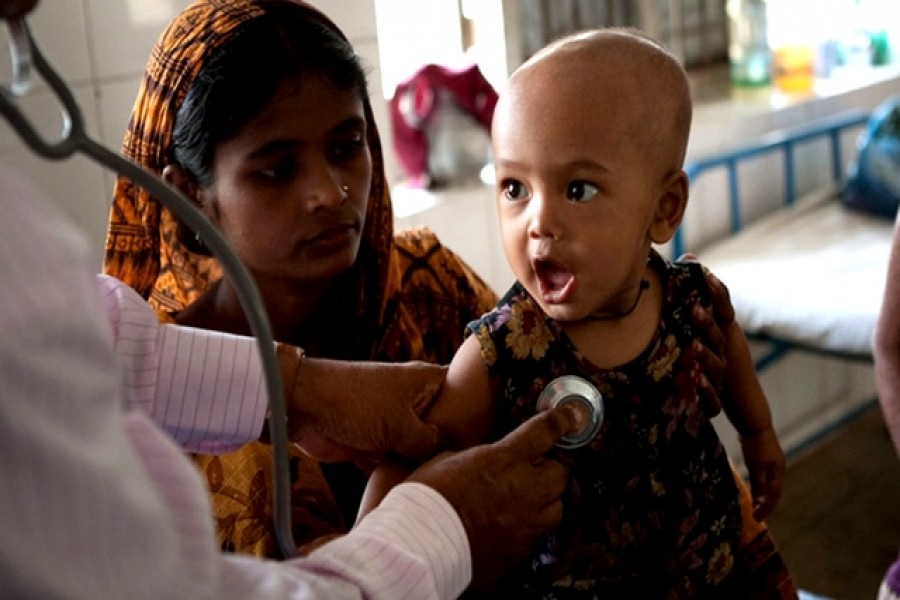
Published :
Updated :

Future of all nations depend on their younger generation, more specifically children. But they suffer numerous kinds of deprivations in developing countries like Bangladesh, especially in the areas of access to education, nutrition and healthcare. The current Covid-19 pandemic has worsened the situation for children to a great extent, as is visible across the globe.
Healthcare services for children below five years in Bangladesh have declined in recent times due to the pandemic, according to a recent release by the United Nations Children's Fund (UNICEF). The agency has warned that an additional 28,000 children might die from preventable causes during the next six months if the situation in the country slides to the worst possible level. This projection has been arrived at on the basis of a research conducted by Johns Hopkins University of USA and published in the prestigious British medical journal 'Lancet'.
The Johns Hopkins research has predicted an additional 1.2 million fatalities of under-5 children in 118 low-cum-medium-income countries including Bangladesh in case the situation plunges to the worst possible scenario within the next six months. Usually 2.5 million under-5 children die in these countries every six months and the additional 1.2 million would be in excess of that figure.
The factors that are likely to cause these additional deaths include increased malnutrition, lesser access to healthcare-cum-family planning services, dearth of pre and postnatal care, infections of the new-born, lesser vaccinations and reduced treatment for pneumonia.
The lives of children and their social protection have been jeopardised due to the spread of Covid-19 globally. Provision of the children's education and their food supply has also been seriously hampered. Furthermore, their risks of getting infected by other diseases are gradually on the rise.
The healthcare infrastructures of many countries have been considerably weakened due to disruptions in the supply chain of medicines and medical equipment. Side by side, visits to clinics and other healthcare facilities are declining due to imposition of lockdowns, and restrictions in the movement of vehicles and people.
The research cited by the UNICEF suggests that ten countries are at maximum risk of additional children's deaths if there is the worst possible scenario of the pandemic. These countries are Bangladesh, Brazil, Democratic Republic of Congo, Ethiopia, India, Indonesia, Nigeria, Pakistan, Uganda and Tanzania.
The huge problems and challenges being faced by these countries in ensuring access to essential healthcare for children due to the pandemic are unprecedented since the World War II. Exposing the children to this danger on the pretext of fighting the pandemic and erosion in gains made in the area of maternal and child health over the previous decades cannot be justified.
Receipt of healthcare services in Bangladesh declined by 25 per cent in March this year compared to the previous year due to Covid-19, claims the UNICEF release. Healthcare services for mothers and the new-born babies have also decreased by 19 per cent.
Citing official statistics, the release says that the visits of pregnant mothers to healthcare centres for pregnancy-related services as well as post-delivery care dramatically declined during the January-March quarter this year, compared to the previous October-December quarter. But this decline put at risk the lives of thousands of children who could have been saved through timely preventive and curative measures including vaccination and medication.
In the above backdrop, huge investments are now needed in the country's healthcare sector to improve the situation. The recent appointment of 2,000 physicians and 5,000 additional nurses is certainly a good move, but they need to be integrated into the healthcare apparatus at the grassroots level very quickly.
According to experts, four broad measures should be taken for protecting the children from undue hazards because of the spread of Covid-19 and the chaos and disorder prevailing in the healthcare sector as a result.
Firstly, although the rate of novel coronavirus infection among children is low, the relevant hospitals should keep some beds reserved for child patients. Secondly, the parents must remain alert about symptoms of Covid-19 in their children, so that timely action can be taken. Thirdly, the families should ensure that the infants are getting mother's milk and nutritious food. And fourthly, the immunisation and vaccination programmes for children must continue without any disruption or interruption.
As mothers play the key role in upbringing children, gender-responsive programmes should be undertaken by attaching priority to mothers and adolescent girls, in order to minimise the adverse impact of Covid-19. It is usually observed that the responsibility of taking care of sick family members falls on the shoulders of mothers and girl children, even when the healthcare system fails to address the situation adequately. Country strategies for tackling the situation should therefore be framed on the basis of analysing the roles, responsibilities and condition of women and girl children, as well as measures required for improving the situation.
Women's salaried jobs, and non-salaried care-work-cum-informal services, as well as increased risks of gender-based violence should be taken into cognizance. Besides, mechanisms have to be put in place for supervising the follow-up actions against this violence, including installation of hotlines and service centres.
Many countries have taken initiatives for protecting the healthcare workers and other frontline professionals fighting the pandemic. Similar protection should be accorded to those who are involved in extending maternal and child healthcare. Besides, family-friendly policies need to be adopted for providing medical and child-development services to children and for relieving the stress and trauma they are undergoing.
Continuation of education for all children including adolescent girls should be ensured for the sake of their healthy upbringing, and priority should be attached to their access to education even at remote places. Online educational platforms need to be made secure, so that children, especially girls, do not fall prey to undue sexual harassment.
Dr. Helal Uddin Ahmed is a retired Additional Secretary and former Editor of Bangladesh Quarterly.


 For all latest news, follow The Financial Express Google News channel.
For all latest news, follow The Financial Express Google News channel.